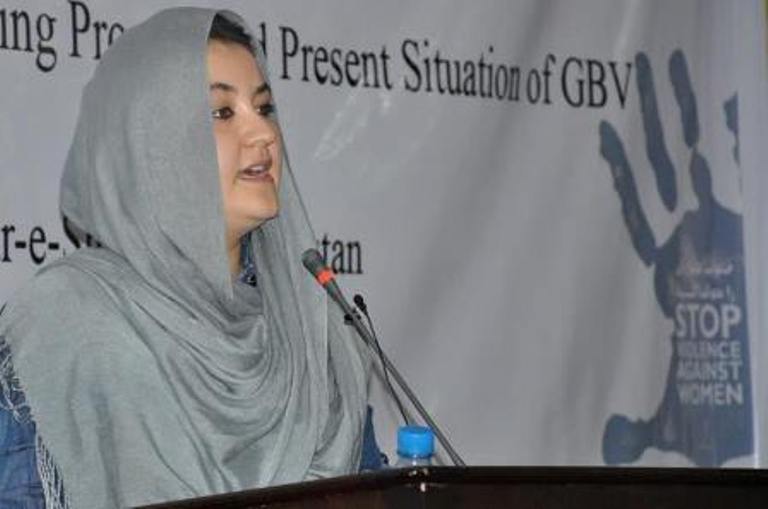Farangis Sogand studied political science and has occupied herself with civil and cultural activities for the past six years. She is a member of organizations such as the Afghanistan Pen Association and the Writers of the Balkh. She is the founder of two literary associations; her writing has been translated into several other languages, and her next collection of poems is ready for publication.
How did find your way into the Balkh Provincial Council?
First, I wanted to utilize my legitimate right and prove to people that women too can participate in larger political elections. Second, my involvement in civil and social initiatives earned me appreciation from other civil society activists, which got me involved in politics.
What did you learn from your political competition during the elections?
Struggling and competing during elections was an experience that brought so many changes to my life. First, I learned that, in comparison to men, it is difficult for women to participate in politics. Second, I learned how to compete using various strategies, and how to stand up against the difficulties that every woman in Afghanistan has to face.
Can you name some of the major obstacles you face as a woman?
The first obstacle was the mindset of the people and their lack of belief in the capabilities of young people, especially girls. With much difficulty I proved to them that young people are more energetic, sincere, and enthusiastic.
The second obstacle was the financial problem facing me and other young people, as we were not like the other, influential people who were participating in the election. Others hosted events and offered meals, but I had to cover all of my expenses by borrowing from my friends and family, who believed in my abilities. They provided me vehicles, printed pamphlets, and stood behind with me.
What conditions contribute to the atmosphere of political participation for young people in Balkh?
The Balkh Provincial Council is the council with the highest percentage of young members who have done graduate and post-graduate work. Balkh is the only province where young people—especially girls—feel secure in all aspects of their work.
What differences do you see between the past and present in Balkh?
When it comes to political, social, cultural, and economic activities, Balkh is always developing. The Balkh provincial council has the highest number of young people and women. I hope this trend continues in the National Assembly during the next parliamentary election.
Based on your experience, what values do you think young politicians keep in mind in their work?
First, they must recognize [the needs of] the people and always participate in social activities. Second, they must believe in themselves and never accept defeat. Third, they must be sincere in their promises and commitments. And fourth, they must increase their political awareness.
How do you see the safety situation for women? We heard you were attacked.
Safety is a major problem for the people of Afghanistan. Therefore, everyone—and especially politicians—is unsafe. The more you are active, the more you are under threat. An attack on me and my husband was carried out by individuals and groups who think my presence in the council will create difficulties for them.
Do you believe attacks like this will distract you from your work?
Not at all! I will continue my fight patiently and confidently.
What is your definition of politics?
According to an objective definition, politics is a knowledge that will help you reach your goals. But based on my thinking, politics is also, in addition to that, a struggle for justice and social equality.
Do you prefer structured political work?
As I have promised my constituents, I will struggle for social justice using all of my physical and mental capacity. It actually does not matter whether you are alone or in a group, but what is important is how you manage and structure your energy.
Do you make an effort to integrate democratic principles into Afghan politics?
Politics demands that you use specific tools for specific situations. One’s political attitude will depend greatly on the prevailing political situation in a society.
Do women have equal participation in Balkh politics?
Women’s participation in civil and cultural activities in Balkh is equal to that of men. But in politics, their presence is smaller.
How much support do you get from your husband and family?
My husband and family have always been supportive of my activities. I think no woman can be successful in a political career in a society like Afghanistan’s unless she is supported by her family.
You’re also involved in the book world. What relationship do you see between literature and politics?
I think they are very closely connected and that things would be better if writers and poets who seek positive change in society would participate in politics. My cultural involvement has helped me move into politics a lot. I think poetry is the soul of a society, and politics aimed at social justice indeed gives this soul a life.
After thirteen years, how different are the lives of young people in Balkh?
Balkh is the city with the largest number of literary, cultural, civil, and social institutions, and they create feasible conditions for youth development. You can feel this when you actually live here.
How do you envision the next ten years?
The picture I’m imagining is of an Afghanistan that is stable, secure, and economically strong.


